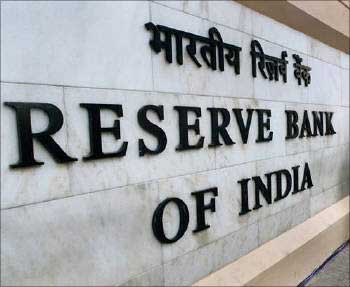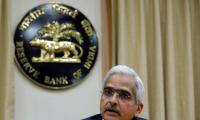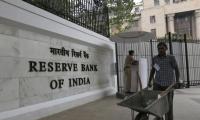RBI Keeps Rates Unchanged, Inflation Remains Top Priority
RBI Governor Shaktikanta Das ruled out loosening interest rates, emphasizing inflation as top priority despite recent positive data. The central bank kept key policy rates unchanged for the fifth consecutive time.

Mumbai, Dec 8 (PTI) Governor Shaktikanta Das on Friday ruled out loosening interest rates, saying inflation remains top priority as a few months of good data should not lead to complacency, even as the Reserve Bank kept key policy rates unchanged for the fifth consecutive time.
The six-member monetary policy committee of the Reserve Bank of India voted to leave the repurchase rate at 6.50 per cent and decided to keep on sucking out liquidity from the system.
Addressing reporters after the bi-monthly policy announcement at the central bank headquarters here, Das clarified that the inclusion of over-tightening in his policy statement should not be construed as anything else.
A "loosening" of the rates is not on the table at all," the governor said.
Sounding more hawkish, Das said, "The primary objective of the monetary policy, as prescribed in the law, is ensuring price stability that's by maintaining inflation at 4 per cent target for a durable time.
...in May 2022 when we had shifted our focus from growth and the priority was given to inflation over growth, that same approach continues now."
"There is no change in that stance at all," he said, underlining, "our decisions are dependent on two major parameters, that is inflation and growth, and inflation is our top priority now and we still have a distance to cover to reach 4 per cent."
He said the word risk of tightening should be read along with the previous part where "I said that a few months of good data should not push us into some kind of a complacency and the fact that inflation has come within the target range also should not lead to any kind of complacency".
Deputy governor Michael Patra also said while with the upwardly revised growth forecast of 7 per cent for the current fiscal (from 6.5 per cent earlier) shows that growth has come back to the trend level, but when it comes to inflation, which averaged at 5.5 per cent so far this year, is way off the target.
Patra went on to qualify the revised GDP forecast of 7 per cent -- driven by higher growth in the first half and the high-frequency data for October and November -- a very conservative estimate".
"As you know the first half estimates have beaten all estimates, including ours. And if you just sort of put that actual numbers and the projections we made in the last policy together, you will get a number closer to 7 per cent. But if you look at October and November high frequency data, which we use for our forecasts now they are all very robust. So if you just take the October and November data you will exceed 7 per cent. So the projected 7 per cent is like a conservative estimate," Patra said.
He said apart from rising rural demand, the confidence for a higher growth also comes from the rising confidence of foreign investors and regulators and businesses on the country.
On the outlook on interest rates, Das said it is very difficult to give a forward guidance on the policy front, terming the future as very fickle as any shock can hit any economy.
On a question about maintaining withdrawal of accommodation while leaving the rates unchanged, Patra, who is in-charge of the monetary policy department, said, "monetary policy is chiefly operated through the interest rate as the monetary policy is a tool of stabilization.
"By stabilization, I mean when GDP goes way above its trend, the task of monetary policy is to bring it down to trend level. And when inflation goes above its target, the monetary policy tries to bring down to the target," Patra explained.
He said there is a certain benchmark where if inflation is at target, and GDP is at trend, "we neither restrict nor accommodate".
On a question as to how long the RBI will continue to maintain an actively disinflationary path, Das said, "All I could tell you is that we will think of changing our stance when we reach inflation to or under the target for a durable time, by which what I mean is reaching 4 per cent should not just be a one-off event. It has to be durably 4 per cent or below."
Governor Das added, "since media has its own way of interpreting our statements, and since I don't want to be inadvertent in any manner, let me say very emphatically that we have no exalted notion of ourselves or to assume that we have become equal to greater than the great warrior Arjuna. What we do is that we have decided to act on time or before time so that we act only when the house is on fire".
However, he noted, "we've made significant progress in bringing down inflation. The steady decline in core inflation indicates that monetary policy is working, but don't rush into any conclusion or get complacent, because inflation management cannot be on an autopilot."
According to the governor, the future path is expected to be clouded by uncertain food prices. CPI data for November is expected to be high five, and the MPC will be highly alert to any signs of derailing of the ongoing disinflation process.
"So we'll continue to actively manage liquidity consistent with the monetary policy stance because we do not wait for the house to catch fire and then act. Prudence at all times is our guiding philosophy," Das said.
The six-member monetary policy committee of the Reserve Bank of India voted to leave the repurchase rate at 6.50 per cent and decided to keep on sucking out liquidity from the system.
Addressing reporters after the bi-monthly policy announcement at the central bank headquarters here, Das clarified that the inclusion of over-tightening in his policy statement should not be construed as anything else.
A "loosening" of the rates is not on the table at all," the governor said.
Sounding more hawkish, Das said, "The primary objective of the monetary policy, as prescribed in the law, is ensuring price stability that's by maintaining inflation at 4 per cent target for a durable time.
...in May 2022 when we had shifted our focus from growth and the priority was given to inflation over growth, that same approach continues now."
"There is no change in that stance at all," he said, underlining, "our decisions are dependent on two major parameters, that is inflation and growth, and inflation is our top priority now and we still have a distance to cover to reach 4 per cent."
He said the word risk of tightening should be read along with the previous part where "I said that a few months of good data should not push us into some kind of a complacency and the fact that inflation has come within the target range also should not lead to any kind of complacency".
Deputy governor Michael Patra also said while with the upwardly revised growth forecast of 7 per cent for the current fiscal (from 6.5 per cent earlier) shows that growth has come back to the trend level, but when it comes to inflation, which averaged at 5.5 per cent so far this year, is way off the target.
Patra went on to qualify the revised GDP forecast of 7 per cent -- driven by higher growth in the first half and the high-frequency data for October and November -- a very conservative estimate".
"As you know the first half estimates have beaten all estimates, including ours. And if you just sort of put that actual numbers and the projections we made in the last policy together, you will get a number closer to 7 per cent. But if you look at October and November high frequency data, which we use for our forecasts now they are all very robust. So if you just take the October and November data you will exceed 7 per cent. So the projected 7 per cent is like a conservative estimate," Patra said.
He said apart from rising rural demand, the confidence for a higher growth also comes from the rising confidence of foreign investors and regulators and businesses on the country.
On the outlook on interest rates, Das said it is very difficult to give a forward guidance on the policy front, terming the future as very fickle as any shock can hit any economy.
On a question about maintaining withdrawal of accommodation while leaving the rates unchanged, Patra, who is in-charge of the monetary policy department, said, "monetary policy is chiefly operated through the interest rate as the monetary policy is a tool of stabilization.
"By stabilization, I mean when GDP goes way above its trend, the task of monetary policy is to bring it down to trend level. And when inflation goes above its target, the monetary policy tries to bring down to the target," Patra explained.
He said there is a certain benchmark where if inflation is at target, and GDP is at trend, "we neither restrict nor accommodate".
On a question as to how long the RBI will continue to maintain an actively disinflationary path, Das said, "All I could tell you is that we will think of changing our stance when we reach inflation to or under the target for a durable time, by which what I mean is reaching 4 per cent should not just be a one-off event. It has to be durably 4 per cent or below."
Governor Das added, "since media has its own way of interpreting our statements, and since I don't want to be inadvertent in any manner, let me say very emphatically that we have no exalted notion of ourselves or to assume that we have become equal to greater than the great warrior Arjuna. What we do is that we have decided to act on time or before time so that we act only when the house is on fire".
However, he noted, "we've made significant progress in bringing down inflation. The steady decline in core inflation indicates that monetary policy is working, but don't rush into any conclusion or get complacent, because inflation management cannot be on an autopilot."
According to the governor, the future path is expected to be clouded by uncertain food prices. CPI data for November is expected to be high five, and the MPC will be highly alert to any signs of derailing of the ongoing disinflation process.
"So we'll continue to actively manage liquidity consistent with the monetary policy stance because we do not wait for the house to catch fire and then act. Prudence at all times is our guiding philosophy," Das said.
You May Like To Read
TODAY'S MOST TRADED COMPANIES
- Company Name
- Price
- Volume
- AvanceTechnologies
- 1.17 ( -4.88)
- 88887803
- Vodafone-Idea-L
- 10.73 ( 0.00)
- 41759699
- Alstone-Textiles
- 0.30 ( -3.23)
- 38604790
- Meesho-L
- 170.20 (+ 53.33)
- 33021643
- Spicejet-Ltd
- 33.88 ( -1.25)
- 28519832






